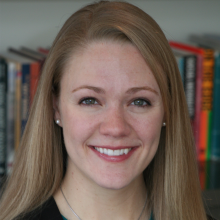September 2020 Spotlight on SRCD U.S. Federal Policy Fellow: Emily Ross, Ph.D.
Emily Ross, Ph.D., is a SRCD Federal Executive Branch Policy Fellow who is placed in the Office of Planning, Research and Evaluation (OPRE), Administration for Children and Families (ACF), U.S. Department of Health and Human Services (HHS)
At the end of August, I completed my second and final year as a SRCD Executive Branch Policy Fellow in the Office of Planning, Research, and Evaluation (OPRE), which sits within the Administration for Children and Families (ACF) in the Department of Health and Human Services (HHS). OPRE conducts research and evaluation projects to improve the economic and social wellbeing of children and families served by ACF programs. We work closely with both career staff and political appointees in the program offices of ACF, including the Offices of Head Start and Child Care, to ensure that the research being conducted is timely and relevant to support decision-making for those federal programs. OPRE’s research also aims to contribute to the wider knowledge base and build research capacity in the field.
I began the fellowship with a number of questions related to how research and policy intersect. One of my primary interests was to understand the pathway between the creation of a policy, the impact of that policy on families’ lives, and where and how research may be able to influence it along the way. Over the past two years, I learned more about this process through my work developing and now co-leading the contract research project titled Understanding the Role of Licensing in Early Care and Education (TRLECE).
TRLECE was funded to strengthen the field’s understanding of the role of the early care and education (ECE) licensing system in supporting outcomes for children, families, providers, and other stakeholders. A key activity of this project is interviewing state licensing agency administrators to understand the challenges faced when making changes to their licensing system based on new provisions in the law that governs how they operate (i.e., the Child Care and Development Block Grant (CCDBG) Act of 2014). The project also aims to learn more about states’ use of and need for research to help guide decisions to support the licensing system and, ultimately, to foster positive outcomes for children and families.
My work on this project allowed me to learn about the process through which legislation becomes enacted on the ground. I learned that once Congress reauthorizes an existing law such as the CCDBG Act of 2014, the executive branch office responsible for actually implementing the program, such as the Office of Child Care, must then develop a Final Rule. The Final Rule is a document that interprets the legislation and outlines the regulations and guidance for states and/or local programs to follow to ensure they are in compliance with the law. States and localities must then apply that guidance in ways that are appropriate for their particular state. In addition, I learned how research was used at each step of the process through which the CCDBG Act of 2014 was enacted into practice. Therefore, it became clear that there are multiple leverage points for research to have an influence on policy, not only in the development stage, but critically during the implementation of law into practice. Indeed, the TRLECE project will continue to build evidence in this field over the next 4 years, with a goal of producing evidence-based resources to support states and territories in continuing to make decisions about how to strengthen their licensing systems to support children and families.
In addition to helping manage multiple research projects like TRLECE, I’ve been fortunate to work closely with the Offices of Head Start and Child Care, through bi-weekly meetings and workgroups, in order to learn about how they operate in the day-to-day and utilize research. Also, I’ve recently received the opportunity to lead new work answering key, shorter-term research questions the Office of Head Start will use to inform program and policy planning over the coming years. This work is just beginning, and will involve managing a team to review existing administrative information and research about topics of interest, as well as potentially interviewing key experts and stakeholders.
My work with the program offices thus far has highlighted the need for research to be timely, accessible, and applicable to the key questions they need to answer. This has been especially apparent during the ongoing COVID-19 pandemic, which required program offices to respond immediately and make significant decisions that have widespread implications for states, providers, and families about childcare access and safety. This immediate and critical need for information also highlighted how OPRE can be nimble in readjusting research priorities to provide support for on-the-ground efforts in a crisis. It has been heartening to see my fellow colleagues in OPRE and the program offices work tirelessly together to identify key questions, analyze existing research and administrative data, modify current data collection efforts, and develop resources to support efforts to provide safe care for children and families who are among the most deeply impacted by this crisis. I am grateful and honored to continue learning from and working alongside those dedicated colleagues as I continue to work for OPRE as a Social Science Research Analyst now that my fellowship has concluded.
